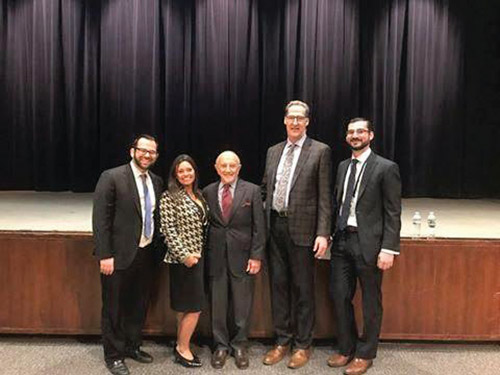

David Hamelech calls out to God, “לא אמות כי אחיה, I will not die, I shall live,” (Psalm 118, Tehillim). A Jew recites this pasuk on most festive days of the Jewish year, every Rosh Chodesh, every Yom Tov and at the Pesach Seder. It is a pasuk that is part of our Hallel, our prayer of praise to God. I have read this passage hundreds, perhaps even thousands, of times. The question on this verse is obvious: If I will not die, doesn’t that automatically mean that I will live? How is one to understand this? On Yom HaShoah I understood a new meaning to this verse.
Today, on Yom HaShoah, I had the opportunity to go to the Picatinny Arsenal. Picatinny Arsenal is an Army base. It houses staff for the Army, Navy and Department of Defense. (No secrets here; this can all be found on Wikipedia.) They also happen to develop ammunition and weapons for the military on this base.
This is the second year in a row that I have been invited to Picatinny. Last year, the leadership at the base realized that they have not done anything to recognize and learn about the Holocaust. To their credit, they understood that this needed to change. A friend and congregant of mine works on the base, and as one of the few Jews who work on the base they asked if he could find a Holocaust survivor who would share his or her story at the base. He reached out to me and I brought in Dr. Abraham Bichler, a noted educator, author and scholar, for the initial Holocaust remembrance program. Attendance was beyond what anyone expected, with generals, lieutenant colonels and deputies in the audience, and Dr. Bichler was inspiring.
This year, I was privileged once again to be invited back to accompany a survivor for their Yom HaShoah program. Being the grandchild of two Holocaust survivors, Yom HaShoah is a significant day for me and I know that my children’s generation will probably be the last to actually see or learn from a living Holocaust survivor.
This time it was more personal. I asked Rabbi Mayer Moskowitz, my wife Sara’s grandfather and one of my personal heroes, to share his story. Watching Saba at our family Sedarim share his Shoah experience with me and my children has left an indelible mark in my life, and I felt that it is an obligation and unique opportunity for all to hear.
After Saba shared his story, I looked around the auditorium and could not find a dry eye in the room. Brigadier General Abramson*, the general of the base, stood up, stating that while he was not prepared to speak, he felt compelled to respond to Saba. He said he was humbled to be in the presence of a man who experienced and endured many hardships and tragedies yet persevered and continues to live a life of happiness dedicated to the Jewish community. Saba spent over five decades teaching and impacting countless children and adults in the classroom, summer camp and beyond.
A member of the audience asked Saba a question that so many of us have. She asked, “How can you stay so positive? Why aren’t you angry?” Saba shared a profound answer: “If you keep anger in you, then you are giving your enemy a place to live inside of you rent-free.” He then added, “I am disappointed that human beings could do what they did. It is sad for them.” He explained that for years he didn’t talk about his experiences because he didn’t think people would believe him. “Who would actually think that human beings could commit such atrocities, sinking to a level that is inhumane?” But he decided to choose life and not death for as long as he lives.
Saba didn’t quite say it, but this is how I now understand the words “לא אמות ,כי אחיה, I will not die, I shall live.”
David HaMelech and Saba continue to teach us that people can experience hell on earth, challenge after challenge, but ultimately it is their choice how they will choose to live their lives. It is often easier to live life as a foregone conclusion, as if it is already over, to be a victim to circumstance, as it would have been for Saba. On our own journeys in life may we learn and continue to develop the inner strength, spirit,and joie de vivre like so many of the survivors model for us.
*Despite the sounding of his last name, Brigadier General Abramson is not Jewish.
By Rabbi Andrew Markowitz
Rabbi Andrew Markowitz is the associate rabbi of Congregation Shomrei Torah in Fair Lawn.












